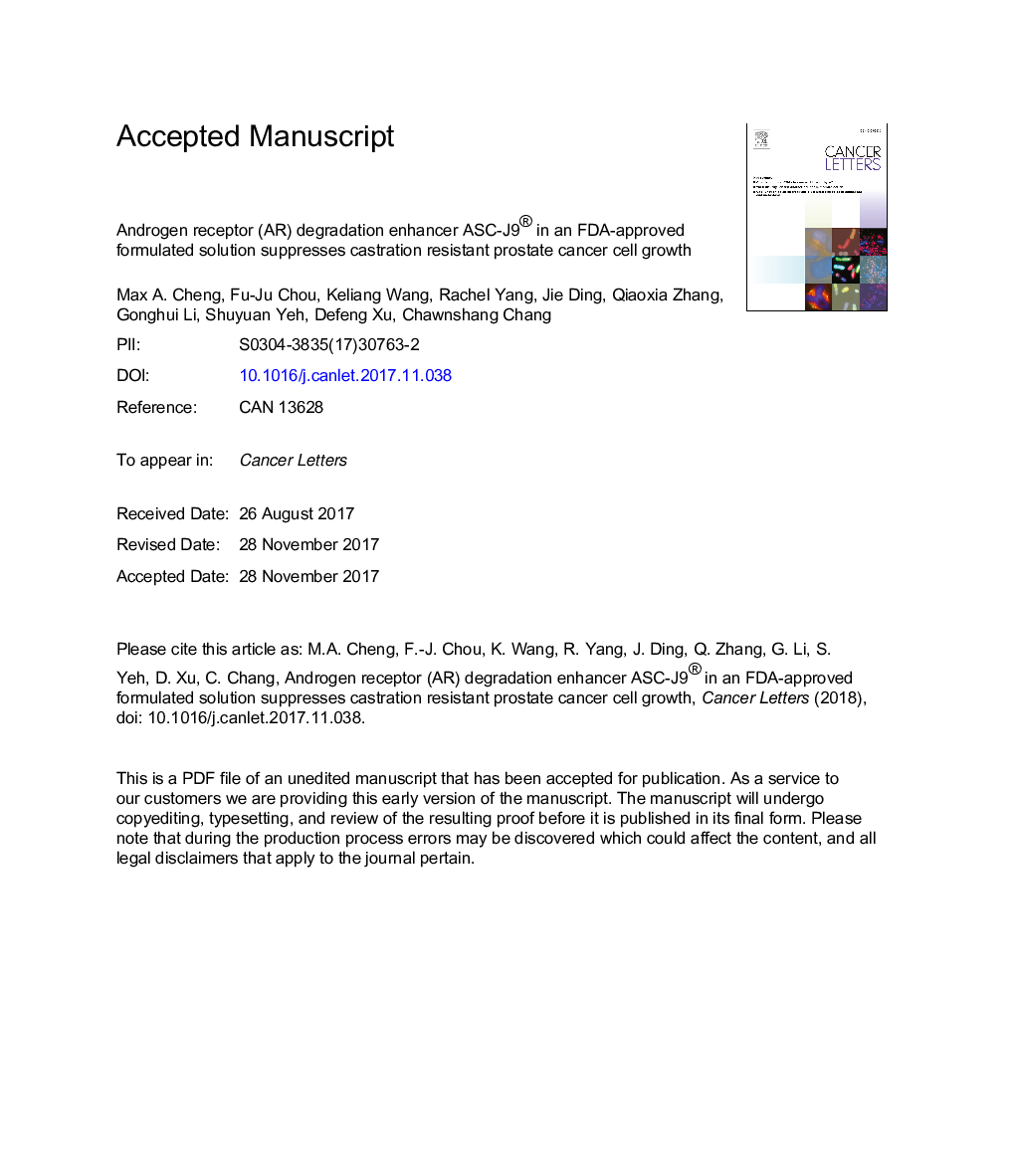| کد مقاله | کد نشریه | سال انتشار | مقاله انگلیسی | نسخه تمام متن |
|---|---|---|---|---|
| 8434880 | 1546652 | 2018 | 38 صفحه PDF | دانلود رایگان |
عنوان انگلیسی مقاله ISI
Androgen receptor (AR) degradation enhancer ASC-J9® in an FDA-approved formulated solution suppresses castration resistant prostate cancer cell growth
دانلود مقاله + سفارش ترجمه
دانلود مقاله ISI انگلیسی
رایگان برای ایرانیان
کلمات کلیدی
ADTMEKKMAP kinase kinaseBcl2MyofibroblastsRT-PCRHEKIC50EGFRFBS3-(4,5-dimethylthiazol-2-yl)-2,5-diphenyltetrazolium bromide - 3- (4،5-dimethylthiazol-2-yl) -2،5-difenyltetrazolium bromideMTT - MTTNFκB - NFKBPCA - PCABax - باکسApoptosis - خزان یاختهایandrogen deprivation therapy - درمان اندروژن محرومیتProstate cancer - سرطان پروستاتfetal bovine serum - سرم جنین گاوepithelial cells - سلول بافت پوششی یا اپیتلیومstromal cells - سلول های استروماhuman embryonic kidney cells - سلول های کلیوی جنینی انسانFibroblasts - فیبروبلاست هاB-cell lymphoma 2 - لنفوم سلول B 2reverse transcription polymerase chain reaction - واکنش زنجیره ای پلیمراز رونویسی معکوسBcl-2-associated X protein - پروتئین X مرتبط با Bcl-2Androgen Receptor - گیرنده آندروژنیEpidermal growth factor receptor - گیرنده فاکتور رشد اپیدرمال
موضوعات مرتبط
علوم زیستی و بیوفناوری
بیوشیمی، ژنتیک و زیست شناسی مولکولی
تحقیقات سرطان
پیش نمایش صفحه اول مقاله

چکیده انگلیسی
ASC-J9® is a recently-developed androgen receptor (AR)-degradation enhancer that effectively suppresses castration resistant prostate cancer (PCa) cell proliferation and invasion. The optimal half maximum inhibitory concentrations (IC50) of ASC-J9® at various PCa cell confluences (20%, 50%, and 100%) were assessed via both short-term MTT growth assays and long-term clonogenic proliferation assays. Our results indicate that the IC50 values for ASC-J9® increased with increasing cell confluency. The IC50 values were significantly decreased in PCa AR-positive cells compared to PCa AR-negative cells or in normal prostate cells. This suggests that ASC-J9® may function mainly via targeting the AR-positive PCa cells with limited unwanted side-effects to suppress the surrounding normal prostate cells. Mechanism dissection indicated that ASC-J9® might function via altering the apoptosis signals to suppress the PCa AR-negative PC-3 cells. Preclinical studies using multiple in vitro PCa cell lines and an in vivo mouse model with xenografted castration-resistant PCa CWR22Rv1 cells demonstrated that ASC-J9® has similar AR degradation effects when dissolved in FDA-approved solvents, including DMSO, PEG-400:Tween-80 (95:5), DMA:Labrasol:Tween-80 (10:45:45), and DMA:Labrasol:Tween-20 (10:45:45). Together, results from preclinical studies suggest a potential new therapy with AR-degradation enhancer ASC-J9® may potentially be ready to be used in human clinical trials in order to better suppress PCa at later castration resistant stages.
ناشر
Database: Elsevier - ScienceDirect (ساینس دایرکت)
Journal: Cancer Letters - Volume 417, 28 March 2018, Pages 182-191
Journal: Cancer Letters - Volume 417, 28 March 2018, Pages 182-191
نویسندگان
Max A. Cheng, Fu-Ju Chou, Keliang Wang, Rachel Yang, Jie Ding, Qiaoxia Zhang, Gonghui Li, Shuyuan Yeh, Defeng Xu, Chawnshang Chang,